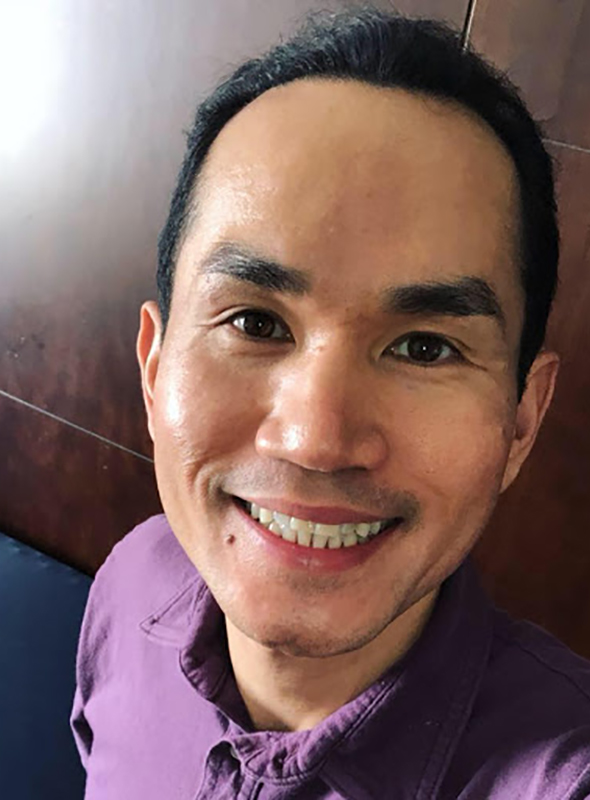Peter’s story
Peter Cruz
I was raised in a religious household in southern California where my mom was a devout member of the ultra-conservative sect of Catholicism known as Opus Dei. As a first-generation Filipino American and the youngest of five children, I had a close bond with my mom that was strengthened through our involvement with the church. I accompanied her to daily Mass and volunteered at our parish as an altar server for many years.
But when I came out to my mom in high school, I was pressured into conversion therapy to change my sexual orientation. I became afraid that what once brought us close together — our deep Catholic piety — would become the very thing that would tear us apart.
Everything I learned up to this point was that being gay was an abomination. Scared and needing guidance at age 17, I soon confided in one of the priests at our church. When he set up a meeting to inform my mom, she became very upset and started to cry, blaming herself for the way I “turned out.” I thought the priest was being supportive when he said, “We still love you. It’s not that we hate homosexuals, but we condemn the act.”
Feeling guilty at the thought of disappointing my mom, I told the priest I’d do whatever he advised. It was then he suggested meeting with Joseph Nicolosi, the “father of conversion therapy,” who I started to see regularly shortly thereafter.
Also known as “ex-gay” or “reparative therapy,” conversion therapy uses a variety of techniques to try to change a person’s sexual orientation or gender identity. These “treatments” have been denounced as ineffective and harmful by every major medical and mental health organization in the U.S.
A recent Williams Institute study finds that an estimated 20,000 children ages 13 to 17 will be subjected to conversion therapy by a licensed medical professional, and 57,000 LGBTQ youth will be “treated” by a religious or spiritual advisor. I’m sad to say I am one out of the nearly 700,000 LGBTQ adults in the United States who have been subjected to these harmful practices.
At our initial meeting, Nicolosi described circumstances in a person’s upbringing that leads one to “believe they are homosexual.” Because I didn’t have a strong male father figure to balance the close relationship I had with my mom, Nicolosi explained, I started to mirror her feminine characteristics, including her sexual attraction to men.
To counter this, Nicolosi directed me to spend more time with my father. I followed his suggestion and saw my dad as often as I could, but I stayed closeted with him at my mother’s request. As a result, our interactions were very awkward because he did not know the motivation behind my actions. And like many other Asian American families, my family did not openly talk about sex or sexual identity. We were raised to always do well in school, go to church, and not do anything that would cause the family to lose face in the community.
Eventually, the tone of Nicolosi’s sessions became more hostile. “You’re not trying hard enough,” he said. “If you choose this lifestyle, you’re going to get AIDS and die.” His words stuck with me, as if I only heard them yesterday.
My relationship with Nicolosi became so tense that I eventually refused to speak during our sessions. When he suggested hypnotherapy as another technique, I was at my breaking point. Feeling my distress, my mom finally suspended our sessions.
I was traumatized by the whole experience. It led me down a path of severe depression, and at one point I attempted to take my own life. I feel blessed that I did not acquire any life-threatening illnesses from ages 18 to 21, when I consistently engaged in high-risk behaviors to cope with the negative experiences from coming out.
In recent years, my parents learned to open their hearts to the LGBTQ community after one of my brothers revealed he was gay a few years after my time in conversion therapy. When he passed away in 2012, my parents did not hide who he loved: at his funeral, they allowed my brother’s boyfriend to speak not as his friend, but as his partner.
I’ve heard so many stories of LGBTQ people whose parents refuse to acknowledge who their children love. Having my brother’s partner speak to an audience of mostly Filipino-American Catholics — a community where misinformation about LGBTQ people is widespread — was a strong point of activism from my parents, and one that I respect them for deeply.
Despite being a difficult year for our family, it was 2012 when California became the first state to prohibit licensed mental health professionals from practicing conversion therapy on minors. As tracked by the National Center for LGBTQ Rights’ (NCLR) Born Perfect Campaign, 13 additional states and the District of Columbia have secured legislation protecting youth from these dangerous practices.
I’m lucky to now have a faith community that helps me overcome the trauma of conversion therapy, by virtue of understanding my gay identity as a gift from God. This realization has allowed me to build a stronger relationship with my family, and especially my mom.
Now living as an out and proud gay man, I hope I can inspire others to live authentically, no matter how difficult or challenging it may be.
Peter Cruz recently served as associate director of HRC’s HIV and Health Equity program and has been working in HIV services since 2003. Prior to joining the HRC family, Peter served as the Associate Director at APAIT (Asian Pacific AIDS Intervention Team), an HIV service organization based in Los Angeles.
This piece originally appeared in INTO on October 25, 2018.










